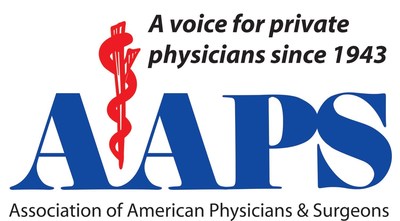Compulsory Treatment for Doctors Needs Ethical Standards, States Journal of American Physicians and Surgeons
TUCSON, Ariz., June 12, 2019 /PRNewswire/ -- Moral injury and risk for suicide may result from physicians' perceptions of coercion in the treatment methods they receive in Physician Health Programs (PHPs) and "preferred physician treatment programs," and independent oversight and ethical standards are needed, writes psychiatrist Robert Emmons, M.D., in the summer issue of the Journal of American Physicians and Surgeons.

Originally intended to help physicians with addictions recover and return to practice, PHPs are now used for an expansive list of allegedly impairing mental conditions, Dr. Emmons writes. The formerly collegial, clinical process has become in many instances an adversarial legal one. Exclusive referral relationships and often unregulated financial ties now bind medical licensure boards, hospital peer review committees, PHPs, and preferred physician treatment programs into a "medical regulatory-therapeutic complex" (MRTC).
Compliance with orders for treatment, often in remote, massively expensive inpatient facilities, is enforced by threat of loss of licensure. Patients who face civil commitment for psychiatric treatment have their civil rights assiduously protected. In contrast, the claim is made by leaders in the MRTC that physicians knowingly agree to mental health screening essentially at the will of medical boards when they apply for their licenses.
Leaders in the MRTC deny that the common practices in their field amount to coercive treatment, although this is the usual perception of physician-patients referred to a PHP. Physicians who are disappointed in their expectations of clinical relationships of trust in what they erroneously suppose to be ordinary treatment situations are likely to experience feelings of betrayal and moral injury, which may lead to despair, an expectation of exploitation, and suicidal thoughts.
In ordinary, non-coercive clinical environments, patients who receive bad advice or who simply do not agree with evaluators or treaters can escape by seeking second opinions. In the MRTC, physician-patients are not allowed to refuse to accept false positive diagnosis, unnecessary care, unsatisfactory treatment, or bad-faith practice. Even when practitioners in the MRTC adhere to their own guidelines for best practices, the discrepancy between what they think is necessary to protect the public and physician-patients' expectations of ordinary clinical ethical standards is enough to create the conditions for moral injury.
While it may be difficult to prove or disprove causal links between practices in the MRTC and the risk of specific adverse outcomes, the limited evidence that suggests an elevated risk for suicide in physicians mandated into these programs is enough, says Dr. Emmons, to compel immediate action to try to avert catastrophic and unacceptable events. For any physician mandated into evaluation or treatment in the MRTC, risk for suicide should be re-evaluated on a regular basis. Intensive, independent investigation of practices in the MRTC is paramount when questions about safety and efficacy arise about a treatment that is imposed upon unwilling patients.
Ethical guidelines for the use of coercion in the MRTC are proposed. Meanwhile, "attorneys who represent physicians need to understand the clinical risks and ethical problems with coerced treatment and fitness-for-duty assessment in the MRTC before advising their clients on their responses to mandates from medical licensure boards and other referring entities," Dr. Emmons writes. Physicians who perceive mental illness in themselves, or are alleged to have signs of impairment, should consider seeking evaluation and treatment outside the MRTC.
The Journal of American Physicians and Surgeons is published by the Association of American Physicians and Surgeons (AAPS), a national organization representing physicians in all specialties since 1943.
![]() View original content to download multimedia:http://www.prnewswire.com/news-releases/compulsory-treatment-for-doctors-needs-ethical-standards-states-journal-of-american-physicians-and-surgeons-300866471.html
View original content to download multimedia:http://www.prnewswire.com/news-releases/compulsory-treatment-for-doctors-needs-ethical-standards-states-journal-of-american-physicians-and-surgeons-300866471.html
SOURCE Association of American Physicians and Surgeons (AAPS)
